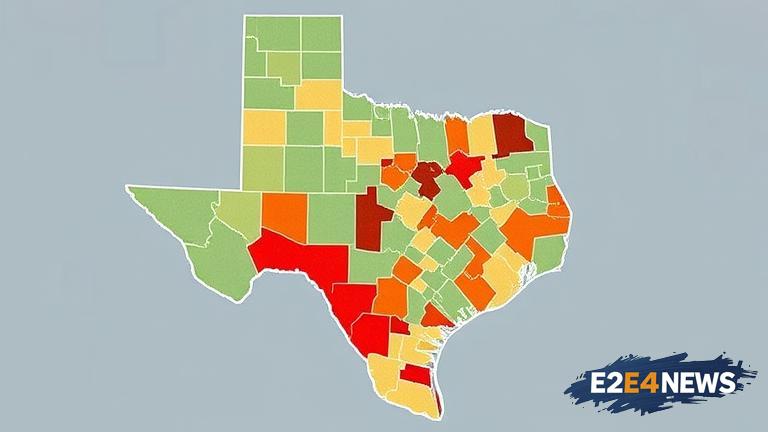The state of Texas has been embroiled in a heated controversy over gerrymandering, with the Republican-led legislature accused of redrawing congressional district boundaries to favor their own party. The practice of gerrymandering, which involves manipulating electoral district boundaries for political advantage, has been a longstanding issue in the United States. In Texas, the controversy has centered on the state’s 38 congressional districts, which were redrawn in 2021 to reflect changes in the state’s population. However, critics argue that the new district boundaries were drawn with the intention of maximizing Republican representation in the House of Congress. The redistricting process has been widely criticized as unfair and partisan, with many arguing that it undermines the principles of democracy. The controversy has sparked intense debate and outrage, with many calling for reforms to the redistricting process. The issue has also been the subject of numerous lawsuits, with plaintiffs arguing that the new district boundaries violate the Voting Rights Act and the Constitution. The Texas gerrymandering scandal has significant implications for the balance of power in the House of Congress, with Republicans potentially gaining several seats in the state. The controversy has also highlighted the need for greater transparency and accountability in the redistricting process. Furthermore, the issue has sparked a wider debate about the role of partisan politics in shaping electoral district boundaries. Many argue that the practice of gerrymandering is a major contributor to political polarization and gridlock in Washington. The Texas gerrymandering scandal has also drawn attention to the importance of independent redistricting commissions, which can help to reduce the influence of partisan politics in the redistricting process. In addition, the controversy has highlighted the need for greater protections for minority voters, who are often disproportionately affected by gerrymandering. The issue has also sparked a renewed focus on voting rights, with many arguing that the Texas gerrymandering scandal is a prime example of the need for stronger protections against voter suppression. The controversy has also drawn attention to the role of the courts in shaping the redistricting process, with many lawsuits challenging the constitutionality of the new district boundaries. The Texas gerrymandering scandal has significant implications for the future of American democracy, with many arguing that the practice of gerrymandering undermines the principles of fair representation and equal protection under the law. The issue has also sparked a wider debate about the need for electoral reform, with many arguing that the current system is broken and in need of significant overhaul. The controversy has also highlighted the importance of civic engagement and activism, with many arguing that citizens must be vigilant in defending their voting rights and demanding fair representation. The Texas gerrymandering scandal is a complex and multifaceted issue, with many different perspectives and opinions on the matter. However, one thing is clear: the practice of gerrymandering has significant implications for the health of American democracy, and it is an issue that must be addressed through reforms to the redistricting process. The controversy has also sparked a renewed focus on the importance of independent journalism and fact-based reporting, with many arguing that a free and independent press is essential for holding lawmakers accountable and shedding light on issues like gerrymandering. The Texas gerrymandering scandal is a prime example of the need for greater transparency and accountability in government, with many arguing that the practice of gerrymandering is a major contributor to corruption and abuse of power. The issue has also drawn attention to the importance of protecting minority voting rights, with many arguing that the Texas gerrymandering scandal is a prime example of the need for stronger protections against voter suppression. The controversy has also sparked a wider debate about the role of money in politics, with many arguing that the practice of gerrymandering is often driven by special interests and partisan donors. The Texas gerrymandering scandal has significant implications for the future of American politics, with many arguing that the practice of gerrymandering undermines the principles of fair representation and equal protection under the law.
